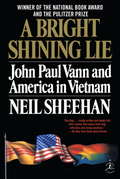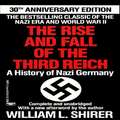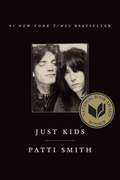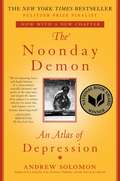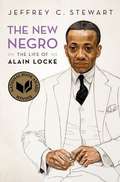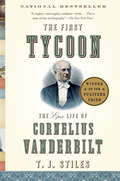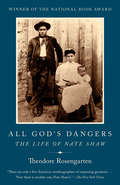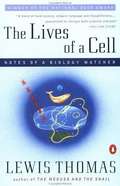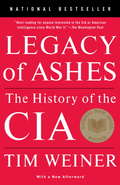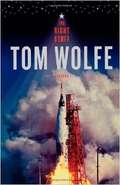Special Collections
National Book Award Winners - Non-Fiction
- Table View
- List View
A Bright Shining Lie
by Neil SheehanOutspoken and fearless, John Paul Vann arrived in Vietnam in 1962, full of confidence in America's might and right to prevail. A Bright Shining Lie reveals the truth about the war in Vietnam as it unfolded before Vann's eyes: the arrogance and professional corruption of the U.S. military system of the 1960s, the incompetence and venality of the South Vietnamese army, the nightmare of death and destruction that began with the arrival of the American forces. Witnessing the arrogance and self-deception firsthand, Vann put his life and career on the line in an attempt to convince his superiors that the war should be fought another way. But by the time he died in 1972, Vann had embraced the follies he once decried. He went to his grave believing that the war had been won.
A haunting and critically acclaimed masterpiece, A Bright Shining Lie is a timeless account of the American experience in Vietnam–a work that is epic in scope, piercing in detail, and told with the keen understanding of a journalist who was actually there. Neil Sheehan' s classic serves as a stunning revelation for all who thought they understood the war.
Winner of the Pulitzer Prize.
Winner of the National Book Award
The Rise and Fall of the Third Reich
by William L. ShirerBefore the Nazies could destroy the files, famed foreign correspondent and historian William L. Shirer sifted through the massive self-documentation of the Third Reich, to create a monumental study that has been widely acclaimed as the definitive record of one of the most frightening chapters in the history of mankind--now in a special 30th anniversary edition.
Winner of the National Book Award
Just Kids
by Patti SmithPatti Smith would evolve as a poet and performer, and Robert Mapplethorpe would direct his highly provocative style toward photography. Bound in innocence and enthusiasm, they traversed the city from Coney Island to Forty-second Street, and eventually to the celebrated round table of Max's Kansas City, where the Andy Warhol contingent held court. In 1969, the pair set up camp at the Hotel Chelsea and soon entered a community of the famous and infamous- the influential artists of the day and the colorful fringe. It was a time of heightened awareness, when the worlds of poetry, rock and roll, art, and sexual politics were colliding and exploding. In this milieu, two kids made a pact to take care of each other. Scrappy, romantic, committed to create, and fueled by their mutual dreams and drives, they would prod and provide for one another during the hungry years. Just Kids begins as a love story and ends as an elegy. It serves as a salute to New York City during the late sixties and seventies and to its rich and poor, its hustlers and hellions. A true fable, it is a portrait of two young artists' ascent, a prelude to fame.
Winner of the National Book Award
The Noonday Demon
by Andrew SolomonWith uncommon humanity, candor, wit, and erudition, award-winning author Andrew Solomon takes the reader on a journey of incomparable range and resonance into the most pervasive of family secrets. His contribution to our understanding not only of mental illness but also of the human condition is truly stunning.
The Noonday Demon examines depression in personal, cultural, and scientific terms. Drawing on his own struggles with the illness and interviews with fellow sufferers, doctors and scientists, policymakers and politicians, drug designers and philosophers, Solomon reveals the subtle complexities and sheer agony of the disease. He confronts the challenge of defining the illness and describes the vast range of available medications, the efficacy of alternative treatments, and the impact the malady has had on various demographic populations around the world and throughout history. He also explores the thorny patch of moral and ethical questions posed by emerging biological explanations for mental illness.
The depth of human experience Solomon chronicles, the range of his intelligence, and his boundless curiosity and compassion will change the reader's view of the world.
The New Negro
by Jeffrey C. StewartWinner of the 2018 National Book Award for Nonfiction.
A tiny, fastidiously dressed man emerged from Black Philadelphia around the turn of the century to mentor a generation of young artists including Langston Hughes, Zora Neale Hurston, and Jacob Lawrence and call them the New Negro -- the creative African Americans whose art, literature, music, and drama would inspire Black people to greatness.
In The New Negro: The Life of Alain Locke, Jeffrey C. Stewart offers the definitive biography of the father of the Harlem Renaissance, based on the extant primary sources of his life and on interviews with those who knew him personally. He narrates the education of Locke, including his becoming the first African American Rhodes Scholar and earning a PhD in philosophy at Harvard University, and his long career as a professor at Howard University. Locke also received a cosmopolitan, aesthetic education through his travels in continental Europe, where he came to appreciate the beauty of art and experienced a freedom unknown to him in the United States. And yet he became most closely associated with the flowering of Black culture in Jazz Age America and his promotion of the literary and artistic work of African Americans as the quintessential creations of American modernism. In the process he looked to Africa to find the proud and beautiful roots of the race. Shifting the discussion of race from politics and economics to the arts, he helped establish the idea that Black urban communities could be crucibles of creativity. Stewart explores both Locke's professional and private life, including his relationships with his mother, his friends, and his white patrons, as well as his lifelong search for love as a gay man.
Stewart's thought-provoking biography recreates the worlds of this illustrious, enigmatic man who, in promoting the cultural heritage of Black people, became -- in the process -- a New Negro himself.
The First Tycoon
by T. J. StilesA gripping, groundbreaking biography of the combative man whose genius and force of will created modern capitalism.
Founder of a dynasty, builder of the original Grand Central, creator of an impossibly vast fortune, Cornelius "Commodore" Vanderbilt is an American icon. Humbly born on Staten Island during George Washington's presidency, he rose from boatman to builder of the nation's largest fleet of steamships to lord of a railroad empire. Lincoln consulted him on steamship strategy during the Civil War; Jay Gould was first his uneasy ally and then sworn enemy; and Victoria Woodhull, the first woman to run for president of the United States, was his spiritual counselor. We see Vanderbilt help to launch the transportation revolution, propel the Gold Rush, reshape Manhattan, and invent the modern corporation--in fact, as T. J. Stiles elegantly argues, Vanderbilt did more than perhaps any other individual to create the economic world we live in today.
In The First Tycoon, Stiles offers the first complete, authoritative biography of this titan, and the first comprehensive account of the Commodore's personal life. It is a sweeping, fast-moving epic, and a complex portrait of the great man. Vanderbilt, Stiles shows, embraced the philosophy of the Jacksonian Democrats and withstood attacks by his conservative enemies for being too competitive. He was a visionary who pioneered business models. He was an unschooled fistfighter who came to command the respect of New York's social elite. And he was a father who struggled with a gambling-addicted son, a husband who was loving yet abusive, and, finally, an old man who was obsessed with contacting the dead.
The First Tycoon is the exhilarating story of a man and a nation maturing together: the powerful account of a man whose life was as epic and complex as American history itself.
Winner of the National Book Award
Winner of the Pulitzer Prize
All God's Dangers
by Theodore RosengartenClassic of oral history tells the life story of Nate Shaw, an illiterate black sharecropper who stood up against white farmers in the 1930's and spent time in prison for it. Includes much folklore and information about rural life.
Winner of the National Book Award
Lives of a Cell
by Lewis ThomasElegant, suggestive, and clarifying, Lewis Thomas's profoundly humane vision explores the world around us and examines the complex interdependence of all things. Extending beyond the usual limitations of biological science and into a vast and wondrous world of hidden relationships, this provocative book explores in personal, poetic essays to topics such as computers, germs, language, music, death, insects, and medicine. Lewis Thomas writes, "Once you have become permanently startled, as I am, by the realization that we are a social species, you tend to keep an eye out for the pieces of evidence that this is, by and large, good for us."
Winner of the National Book Award
Legacy of Ashes
by Tim WeinerWith shocking revelations that made headlines in papers across the country, Pulitzer-Prize-winner Tim Weiner gets at the truth behind the CIA and uncovers here why nearly every CIA Director has left the agency in worse shape than when he found it; and how these profound failures jeopardize our national security.
The Right Stuff
by Tom WolfeThe Right Stuff is Tom Wolfe's deft account of a cast of heroes, introduced to America with the explosion of space exploration in the romantic heyday of the 20th century and encapsulated in Neal Armstrong's "one giant step for mankind."
Beginning with the first experiments with manned space flight in the 1940s, remembering the feats of Chuck Yeager and the breaking of the sound barrier, and focusing in on the brave pilots of the Mercury Project, Wolfe's ability to marry historical fact with dramatic intensity is nowhere more evident than in The Right Stuff.
Winner of the National Book Award
